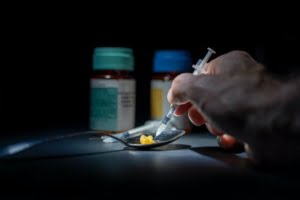Trying to understand the relationship between mental health and substance abuse can be very tricky. The fact that a great number of people suffering from a mental health condition also struggle with substance abuse is a huge cause for concern, especially when deciding on treatment plans.
The question that is always hard to answer is: what caused what? Did the mental health condition lead to the substance abuse, or vice-versa? Studies have shown that some mental health conditions are in themselves risk factors for someone developing a substance abuse disorder. However, certain substances have also been noted to contribute to the onset of certain mental health conditions.
Mental health conditions and substance abuse shared risk factors.
One of the reasons that can make understanding the relationship between mental health conditions and substance abuse is the fact they share common risk factors. This means that both conditions develop due to almost identical contributors. Below are some overlapping factors to consider.
Adverse childhood experiences.
 Children who have grown up with harsh and sometimes traumatic childhood are at a higher risk of developing both mental health conditions and substance abuse, as Christian Counselors for Children point out. To escape their harsh realities, they might start experimenting with substances at a much earlier age.
Children who have grown up with harsh and sometimes traumatic childhood are at a higher risk of developing both mental health conditions and substance abuse, as Christian Counselors for Children point out. To escape their harsh realities, they might start experimenting with substances at a much earlier age.
This early onset of drugs and substances might interfere with the developing brain, which will contribute to the development of mental health disorders in later years. Growing up in adverse situations on its own has been studied to be one of the main causes of mental health issues like anxiety, PTSD, and depression in adults.
Trauma.
People who have experienced trauma in their life are at high risk for developing both a mental health condition and substance abuse disorder. Being physically and or emotionally traumatized leads to the development of PTSD. As a way of coping with PTSD, those struggling with it might self-medicate to mitigate the symptoms. Many people who have PTSD are simultaneously diagnosed with a substance abuse disorder.
Genetic vulnerabilities.
Genetic predisposition plays a role in the development of both mental health conditions and substance abuse disorders. In certain cases, the same genes are responsible for both. People with families with a history of both mental health conditions and substance abuse have been seen to be at a higher risk of developing both. This is due to the intricate interplay between their genetic predisposition and learned behavior within the family system.
Inadequate support structures.
Society has not developed adequate support structures for both conditions. People suffering from one or both conditions find that they have limited options when it comes to support and treatment facilities. The fact that it can also be expensive to seek help for both means not everyone who needs help with either or both receives treatment.
Environmental factors.
 Our social upbringing has a huge impact on us and who we grow up to be. The world around us exposes us to what we consider to be normal and acceptable. In societies where substance abuse is prevalent, there is a high chance that those who grew up in those environments will use substances which can later develop into substance use disorder.
Our social upbringing has a huge impact on us and who we grow up to be. The world around us exposes us to what we consider to be normal and acceptable. In societies where substance abuse is prevalent, there is a high chance that those who grew up in those environments will use substances which can later develop into substance use disorder.
Environmental factors also have been seen to contribute to the development of certain mental health disorders. An example is war-torn environments. Those who live there might develop PTSD, anxiety disorders, and or depression.
Neurotransmitters.
Both conditions affect the functioning of the brain, in particular the brain’s neurotransmitters. Those struggling with mental health conditions and substance abuse wrestle with imbalances in dopamine, glutamate, serotonin, GABA, and norepinephrine.
Presence of stigma.
Both conditions are shrouded in shame, judgment, and stigma. The main reason for this is a lack of education about both conditions and how to help those who are struggling with one or both. This stigma means that those who struggle may not seek help when they need to do so. Instead, they may self-medicate and unfortunately in certain cases may overdose.
Stress.
Unrelenting stressful situations can cause emotional and mental distress, which can develop into other mental health disorders. As a way of coping, those experiencing chronic stress situations may decide to turn to substances. Our stress response has also been linked to our genetic predisposition, which unfortunately can affect functions like motivation, adaptation, and learning.
Common mental health conditions that co-exist with substance abuse.
Many mental health conditions often Co-exist with substance abuse disorders. The reasons for that condition depend on what the individual is trying to self-medicate. Below are some reasons why people take substances when suffering from a mental health condition:
- Relieve or alleviate symptoms.
- Manage mood swings.
- Regulate intense emotions.
- Numb feelings of shame or hopelessness.
Not everyone who suffers from a mental health condition will turn to substances, but the correlation is quite high. Below are some common conditions that make people more susceptible to substance abuse.
- Depression.
- Anxiety Disorders.
- Schizophrenia.
- Borderline Personality Disorder.
- PTSD.
- Bipolar.
Treatment options for a dual diagnosis.
 A dual diagnosis is given when there is a simultaneous presence of two or more medical conditions. In our case, we are dealing with mental health issues and substance abuse disorder. Both conditions need to be treated at the same time.
A dual diagnosis is given when there is a simultaneous presence of two or more medical conditions. In our case, we are dealing with mental health issues and substance abuse disorder. Both conditions need to be treated at the same time.
The main reason for dual treatment is that the substance abuse will interfere with recovery from mental health conditions. Substances also influence brain and psychological activity. Another reason is that some mental health conditions require clients to take medication, whose effects will be hampered by substances.
It could become dangerous to mix the medication with other drugs. The type of substances and the mental health condition determines the treatment course. Below are some common treatment methods.
- Detoxification.
- In-patient rehabilitation.
- Behavioral therapies.
- Group therapies.
- Individual Therapy.
- Medication.
- Support groups.
- Integrative care programs.
When it comes to treatment for a dual diagnosis, it is important to note that much will depend on the individual’s unique circumstances. Treatments might change along the way as progress is made so one can be prepared for several methods being used to ensure recovery.
How to help a loved one.
 People struggling with both mental health conditions and substance abuse have an uphill battle as do those who love them. When a loved one is struggling with mental illness and substance abuse at the same time, the whole family is affected as well as friends and colleagues. They will need all the support they can get as the road is much harder to walk alone.
People struggling with both mental health conditions and substance abuse have an uphill battle as do those who love them. When a loved one is struggling with mental illness and substance abuse at the same time, the whole family is affected as well as friends and colleagues. They will need all the support they can get as the road is much harder to walk alone.
If you have a loved one struggling, it is important to know how and when to help so that you do not lose yourself in an attempt to help, but also give it your best. It will be important to establish boundaries so that you know what you can and cannot do.
A person’s sobriety is their responsibility. So, try not to put your life on hold only to enjoy it when they have recovered. This could be a long, arduous journey. Learn to take care of yourself during it all.
It is also easy to develop a codependent relationship when you are caring for someone struggling with these disorders. Efforts need to be made to avoid enabling their substance abuse. One way to gain support for yourself is to join a support group for education and encouragement.
We are here to help.
Recovery from a dual diagnosis like the ones we are discussing can seem daunting. However, we are here to help. Our facilities and our counselors are equipped to deal with the needs of people with a dual diagnosis. We work as a multi-disciplinary team that will ensure the best treatment course, so please schedule a call with San Diego Christian Counseling today.
“Jungle”, Courtesy of NEOM, Unsplash.com, CC0 License; “Syringe”, Courtesy of Michael Longmire, Unsplash.com, CC0 License; “Hiking”, Courtesy of NEOM, Unsplash.com, CC0 License; “Lunch Meeting”, Courtesy of LinkedIn Sales Navigator, Unsplash.com, CC0 License


